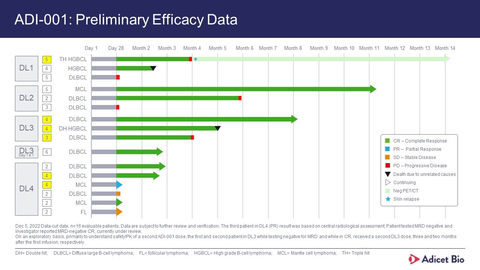Adicet Bio Reports Positive Data from Ongoing ADI-001 Phase 1 Trial in Patients with Relapsed or Refractory Aggressive B-Cell Non-Hodgkin’s Lymphoma (NHL)
ADI-001 demonstrated
Both dose level 2 (DL2) and DL3 demonstrated a six-month CR rate of
Circulating ADI-001 cells visible through day 28 in peripheral blood at DL4
Company expects to initiate a potentially pivotal study in post-CAR T LBCL patients in the second quarter of 2023; Evaluating potential second pivotal study in earlier-line LBCL patients
Company to host investor webcast

Figure 1: ADI-001: Preliminary Efficacy Data (Graphic:
“It is very encouraging to see durability of response at six months and beyond along with a continued favorable safety profile in patients with aggressive lymphomas,” said
“These data are exciting and support our belief that ADI-001 has the potential to generate meaningful clinical responses for patients,” said
“As these data mature, it is impressive to see continued complete responses across all dose levels including six-month durable responses and a
Data highlights as of the
- Of the 16 evaluable patients, three received ADI-001 at dose level 1 (DL1) (30 million CAR+ cells), three received ADI-001 at DL2 (100 million CAR+ cells), three received ADI-001 at DL3 (300 million CAR+ cells), one received two infusions of ADI-001 at DL3 (2X 300 million CAR+ cells on day one and seven following a single lymphodepletion), and six received ADI-001 at DL4 (1 billion CAR+ cells).
- On an exploratory basis, primarily to understand safety and pharmacokinetics of a second ADI-001 dose, the first and second patient in DL3 while testing negative for minimal residual disease (MRD) and in CR, received a second DL3 dose, three and two months after the first infusion, respectively.
- Patients were heavily pretreated with a median number of prior therapies of four (range two-six) and had a poor prognostic outlook based on their median International Prognostic Index (IPI) score.
-
ADI-001 treatment demonstrated a
75% ORR and69% CR rate in the study across all dose levels.
-
In five LBCL patients that previously relapsed after prior autologous anti-CD19 CAR T therapy, treatment with ADI-001 demonstrated
100% ORR and CR rate (5/5). These patients included a triple-hit high-grade B-cell lymphoma patient, three diffuse large B-cell lymphoma (DLBCL) patients, and a double-hit high-grade B-cell lymphoma patient. ADI-001 resulted in CR in patients who previously showed a partial response (PR) to autologous CAR T (2/2).
-
An
86% CR rate (6/7) was observed in LBCL patients across DL3 and above.75% CR rate (9/12) in LBCL across all dose levels.
-
Both DL2 and DL3 demonstrated a six-month CR rate of
33% ; Patient follow up continues in DL4 to assess six-month durability.
- Circulating ADI-001 cells were visible through day 28 in peripheral blood at DL4.
- ADI-001 was generally well-tolerated in the study to date. There were no occurrences of dose-limiting toxicities, graft vs host disease (GvHD), or Grade 3 or higher Cytokine Release Syndrome (CRS) or immune effector cell-associated neurotoxicity syndrome (ICANS) reported.
Table 2: Summary of Phase 1 ADI-001 Preliminary Safety Data in Efficacy-Evaluable Patients as of the
|
DL1 (3E7)
|
DL2 (1E8)
|
DL3 (3E8)
|
DL3 (2X 3E8)
|
DL4 (1E9)
|
Total
|
||||||
Adverse
|
All
|
Gr ≥3
|
All
|
Gr ≥3
|
All
|
Gr ≥3
|
All
|
Gr ≥3
|
All
|
Gr ≥3
|
All
|
Gr ≥3
|
CRS |
2 ( |
0 ( |
0 ( |
0 ( |
0 ( |
0 ( |
1 ( |
0 |
3 ( |
0 ( |
6( |
0 (0) |
ICANS |
0 ( |
0 ( |
1 ( |
0 ( |
0 ( |
0 ( |
0 |
0 |
1( |
0 ( |
2( |
0 (0) |
GvHD |
0 ( |
0 ( |
0 ( |
0 ( |
0 ( |
0 ( |
0 |
0 |
0 ( |
0 ( |
0 (0) |
0 (0) |
DLTs |
0 ( |
0 ( |
0 ( |
0 ( |
0 ( |
0 ( |
0 |
0 |
0 ( |
0 ( |
0 (0) |
0 (0) |
Infection |
1 ( |
0 ( |
0 ( |
0 ( |
1 ( |
1 ( |
0 |
0 |
0 ( |
0 (
|
2 ( |
1 ( |
SAE -
|
1
( |
1
( |
2 ( |
2 ( |
2
( |
2 ( |
0 |
0 |
1
( |
0
( |
6
( |
5
( |
+Safety assessment was performed using the Common Terminology Criteria for Adverse Events (v5) and the
Enrollment in the Phase 1 clinical study of ADI-001 is currently ongoing to provide additional durability data and further support the recommended Phase 2 dose.
The Company expects to discuss with the
Webcast / Conference Call information
Adicet will host a webcast presentation on
The live webcast of the presentation can be accessed by registering under “Presentations & Events” in the investors section of the Company’s website at https://www.adicetbio.com. Upon registration, all participants will receive a confirmation email with a unique passcode to provide access to the webcast event. To participate via telephone, please join by dialing 1-833-548-0276 (domestic) or 1-646-876-9923 (international) and referencing the conference ID 98173615816.
An archived replay will be available for 30 days following the presentation. The archived webcast will be available on the Company's website beginning approximately two hours after the event.
About ADI-001
ADI-001 is an investigational allogeneic gamma delta CAR T cell therapy being developed as a potential treatment for relapsed or refractory B-cell NHL. ADI-001 targets malignant B-cells via an anti-CD20 CAR and via the gamma delta innate and T cell endogenous cytotoxicity receptors. Gamma delta T cells engineered with an anti-CD20 CAR have demonstrated potent anti-tumor activity in preclinical models, leading to long-term control of tumor growth. In
About the GLEAN Study
This Phase 1 study is an open-label, multi-center study of ADI-001 enrolling adults diagnosed with B-cell malignancies who have either relapsed, or are refractory to, at least two prior regimens. The primary objectives of the study are to evaluate the safety, tolerability, pharmacokinetics and pharmacodynamics of ADI-001, and to determine optimal dosing as a monotherapy. The study is expected to enroll approximately 75 patients. For more information about the clinical study design, please visit www.clinicaltrials.gov (NCT04735471).
About
Available Information
Adicet announces material information to the public about the Company, its product candidates and clinical trials, and other matters through a variety of means, including filings with the
Forward-Looking Statements
This press release contains “forward-looking statements” of Adicet within the meaning of the Private Securities Litigation Reform Act of 1995 relating to business and operations of Adicet. The words “anticipate,” “believe,” “continue,” “could,” “estimate,” “expect,” “intend,” “may,” “plan,” “potential,” “predict,” “project,” “should,” “target,” “would” and similar expressions are intended to identify forward-looking statements, although not all forward-looking statements contain these identifying words. These forward-looking statements include, but are not limited to, express or implied statements regarding the potential safety, durability, tolerability and efficacy of ADI-001; the expected progress, timing and success of the Phase 1 study of ADI-001 in relapsed/refractory NHL patients, including ongoing patient enrollment and the identification of a recommended Phase 2 dose; initiation of a potentially pivotal study in the second quarter of 2023 and the potential for a second pivotal study in earlier line LBCL patients; and the Company’s plans to discuss with the EMA and FDA regarding the path to support a BLA and MAA for ADI-001.
Any forward-looking statements in this press release are based on management’s current expectations and beliefs of future events, and are subject to a number of risks and uncertainties that could cause actual results to differ materially and adversely from those set forth in or implied by such forward-looking statements, including without limitation, the effect of COVID-19 on Adicet’s business and financial results, including with respect to disruptions to Adicet’s preclinical or clinical studies, business operations and ability to raise additional capital; Adicet’s ability to execute on its strategy, including obtaining the requisite regulatory approvals on the expected timeline, if at all; that positive results, including interim results, from a preclinical or clinical study may not necessarily be predictive of the results of future or ongoing studies; clinical studies may fail to demonstrate adequate safety and efficacy of Adicet’s product candidates, which would prevent, delay, or limit the scope of regulatory approval and commercialization; and regulatory approval processes of the FDA and comparable foreign regulatory authorities are lengthy, time-consuming, and inherently unpredictable. For a discussion of these and other risks and uncertainties, and other important factors, any of which could cause Adicet’s actual results to differ from those contained in the forward-looking statements, see the section titled “Risk Factors” in Adicet’s most recent Annual Report on Form 10-K for the year ended
View source version on businesswire.com: https://www.businesswire.com/news/home/20221209005627/en/
Investor and Media Contacts
abowdidge@adicetbio.com
Stern Investor Relations, Inc.
212-362-1200
janhavi.mohite@sternir.com
Source:







